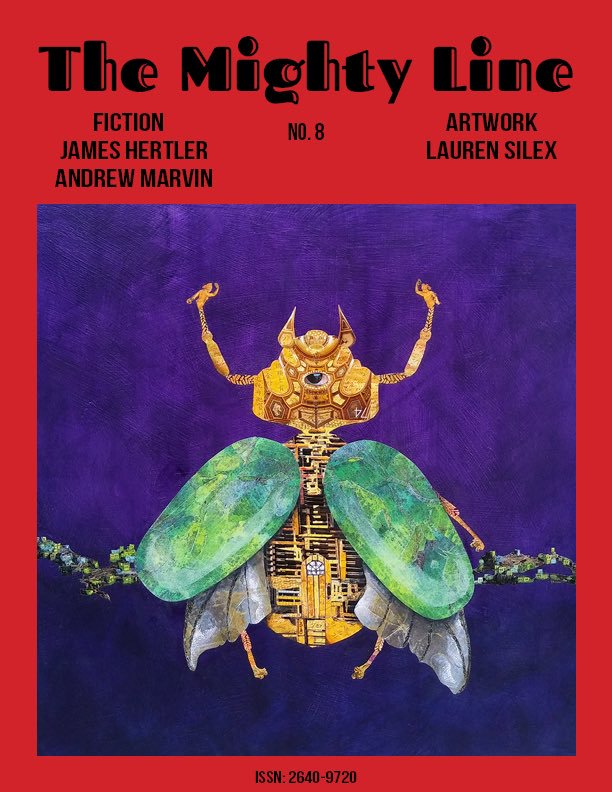The Mighty Line is looking for stories that are technically sound and culturally relevant.
John Hegellund, publisher The Mighty Line
As someone who loves the short story, it’s kind of staggering how many places are you can find them. If, of course, you know where to look. Because so few print magazines feature short fiction, most of these places are to be found online. This is the second in a series of interviews that might steer you towards places I find great stories to read.
Some of these mags, like Storgy, or Twist in Time, have published my work. Others I enjoy but have yet to crack (although it doesn’t stop me from trying.) Such is the case with The Mighty Line magazine.
Here’s my interview with John Heggelund.
The Mighty Line is kind of unique among lit journals. Tell us about it.
The Mighty Line is a digital magazine of short fiction and visual art. We publish our issues online for free (www.TheMightyLine.com) so our contributors can share their work with as broad an audience as possible. We do not solicit fiction. Every story we publish starts in the slush pile, so every submission we receive is given equal attention. Contributors are paid $25. In addition to standard submissions, we offer expedited submissions, which receive responses in two weeks or less, and feedback submissions, which receive a critical essay critiquing the story submitted with suggestions for improving it.

What was the big idea behind the site? That’s a nice way of asking what the hell you were thinking.
The journey from amateur to professional writer is long with few avenues of support. Your friends and family can encourage you, but they can’t edit your work or give you critical feedback, typically. For the most part, magazine editors respond only in form rejections and paying for editing can get real expensive real quick. I received 168 form rejections before my first story was published. I had spent hundreds of dollars on submissions fees and racked up twice that in editing costs. It was all worth it, but it was a huge investment in time and resources that many people can’t afford. I want to change that. That’s why I started The Mighty Line.
You just publish short stories, rather than poetry or essays. You also showcase one visual artist per issue. What kind of material excites you? What are you looking for?
The Mighty Line is looking for stories that are technically sound and culturally relevant. I love a great plot, but if the story does not encourage the reader to reconsider their perspective on the concepts it touches on, then it’s a lot less likely to be selected. We believe stories resolve internalized conflicts by reconciling opposing ideas in specific contexts. This is a citable public good we want to see in everything we publish.

I won’t take it personally that you haven’t selected one of my stories yet, but you do get major karma points for positive encouragement and feedback. But let’s get negative for a second. What drives you crazy about submissions?
Guidelines. There will always be people who don’t follow guidelines, so I’m railing at the wind here, but it’s very frustrating. It seems incredibly rude that some people expect me to read and seriously engage with their work, yet they aren’t willing to even make sure it’s in the requested format. Our guidelines aren’t arbitrary rules for making the submission process more complicated. A readable font, decent spacing, numbered pages, email in the cover letter, these are all things that make my life so much easier.
What are the long-term goals for The Mighty Line?
As long as The Mighty Line continues to exist and publish writers, I’m golden. I didn’t start this magazine to make money. Our submission fees barely cover our costs most months, and the vast majority of those are tied to services such as providing feedback, which is increasingly taking up more of my day. This mag isn’t going to make me rich, and it surely isn’t going to make me famous, but it does give me a daily opportunity to encourage people to critically engage with literature. I want to inspire people to decide for themselves what is good writing and what is bad writing and why. I don’t care if you’re a tenured professor or a dilettante mystery writer, everyone can engage with literature equally. I want to convince as many people of that as possible.
That’s the goal, so as long we’re receiving submissions, I’m living the dream.
If people are motivated to submit now, what should they know?
Follow guidelines, have a discernible theme, and build to a climax in which a decision is made whose ramifications meaningfully subvert or fulfill the reader’s expectations. Do not summarize the story in the cover letter. The longer your cover letter is, the more likely I am to skim it rather than read it. Please, please, please do not send me something unless you are absolutely sure it is ready for publication. Rejecting good stories that aren’t sufficiently refined breaks my heart. Don’t break my heart.
Most of my short stories, published or otherwise, can be found here on this website.
